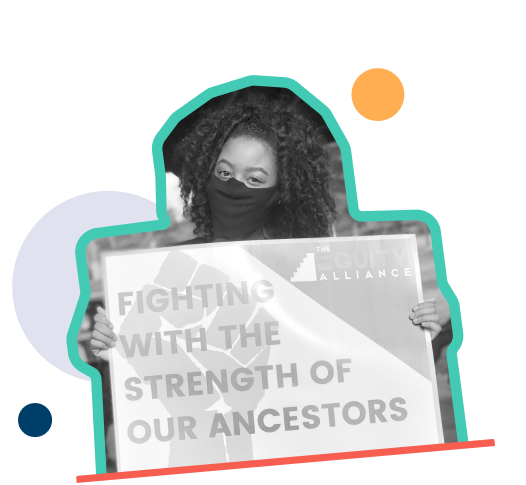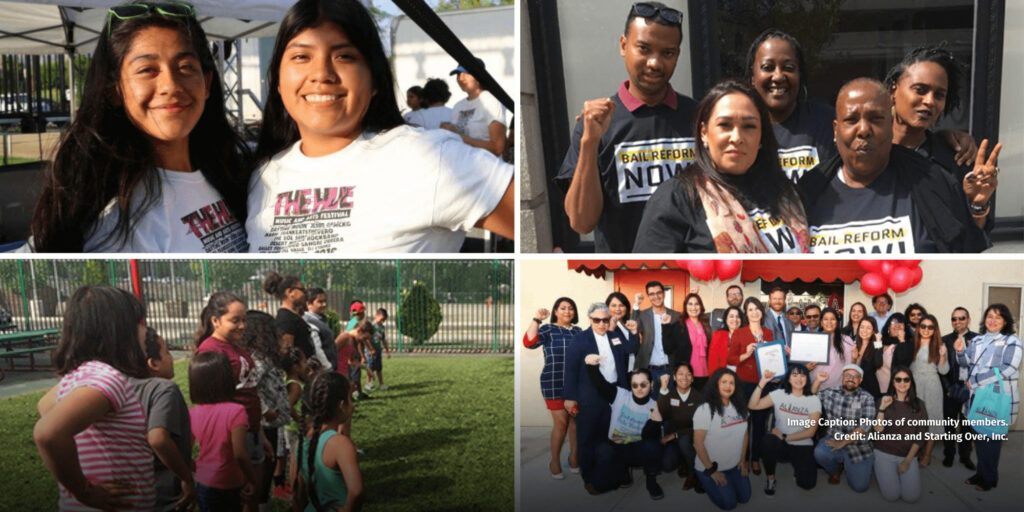Welcome & Keynote Address by Kim Carter
Tuesday, July 27
9:30 AM PT / 10:30 AM MT / 11:30 AM CT / 12:30 PM ET
We are honored to host Kim Carter, Founder and Ambassador for Time for Change Foundation, who will welcome us to Southern California's Inland region and share the importance of the region in the context of California and national policy.
Session 1: Our Story: The Regional History through the Eyes of the People
Tuesday, July 27
9:45 AM - 11:00 AM PT / 10:45 AM - 12:00 PM MT / 11:45 AM - 1:00 PM CT / 12:45 PM - 2:00 PM ET
After a welcome to the virtual visit, the first session will provide a history of the Inland region and the important role that housing plays in terms of public safety, health, and wealth building. From its struggles with racism and exclusion to resistance and grassroots organizing the region is distinguished from neighboring regions both in terms of geographic vastness and population growth. The panelists will discuss systemic racism and the different ways it’s manifested over time through housing, housing access, and land development in the region. Leaders will also share the strategies women, black, youth, and immigrant led organizations have taken on to tear down the walls of racism. This session will situate the Inland region in the context of California and national landscapes.
- Bobbie Butts (moderator), Starting Over, Inc.
- Juan de Lara, University of Southern California and Director of the Latinx and Latin American Studies Center
- Vonya Quarles, Esq., Starting Over, Inc.
- Mary Valdemar, San Bernardino Valley College & San Bernardino Community College District
Session 2: Building Power
Tuesday, July 27
11:45 AM - 1:15 PM PT / 12:45 PM - 2:15 PM MT / 1:45 PM - 3:15 PM CT / 2:45 PM - 4:15 PM ET
In the past decade the shifts in demographics and an invigorating social movement of organizations have created the conditions in the Inland region for innovative and exciting organizing campaigns. Organizations have come together, built strategic networks and launched successful electoral campaigns and coalitions to build power. Power building in the Inland Region is critical to unlocking progressive wins at the state level and influencing federal policies. In this session, panelists will discuss their successes and the opportunities to come in 2021 and beyond.
- Sheheryar Kaoosji (moderator), Warehouse Workers Resource Center
- Sky Allen, Inland Empowerment
- Javier Hernandez, Inland Coalition for Immigrant Justice
- Eugenia Quintero, Juntos Por Un Mejor Oasis
- Ben Reynoso, Inland Congregations United for Change
Session 3: Development for Whom?
Wednesday, July 28
9:45 AM - 11:00 AM PT / 10:45 AM - 12:00 PM MT / 11:45 AM - 1:00 PM CT / 12:45 PM - 2:00 PM ET
Development in the Inland region has focused largely on serving and attracting capital that provides little benefits to existing communities and is often detrimental to existing residents. Two areas of particular focus include investing in the burgeoning goods movement industry and luxury and vacation homes despite the environmental and health and safety impacts of warehousing and the great need for investment in affordable housing and quality jobs in the region. In this session, panelists will discuss their organizing and advocacy strategies to address these trends, confront specific projects that exemplify these trends, and advocate for community benefits. Topics of discussion will include warehousing and goods movement; luxury and vacation housing; and commercial development.
- Phoebe Seaton (moderator), Leadership Counsel for Justice and Accountability
- Stephanie Ambriz, community leader
- Omar Gastelum, Leadership Counsel for Justice and Accountability
- Sonya Gray-Hunn, Congregation Organized for Prophetic Engagement
- Andrea Vidaurre, Peoples Collective for Environmental Justice & Warehouse Worker Resource Center
Session 4: Building the Backbone: Infrastructure and Community Resilience
Wednesday, July 28
9:45 AM - 11:00 AM PT / 10:45 AM - 12:00 PM MT / 11:45 AM - 1:00 PM CT / 12:45 PM - 2:00 PM ET
Lower income communities of color have been excluded from major investment campaigns and programs for decades, leaving entire neighborhoods and communities without the very basics of community infrastructure. Established neighborhoods lack safe drinking water access, reliable and effective wastewater service, sidewalks, stormwater infrastructure, paved roads, and broadband. Municipal planning in many areas excluded communities of color as well, further isolating certain neighborhoods from basic services and infrastructure. In one of the most recent iterations of systemic exclusion, many California climate and planning programs prioritize investment in places that have infrastructure. As a result, places that have been excluded from infrastructure investments are further excluded from investments. In the past decade or so, there has been more attention on historically and systematically excluded neighborhoods and communities, including unincorporated communities. This session will focus on both (1) highlighting ongoing infrastructure deficiencies that serve as barriers to community health and housing development, and (2) community driven efforts to address infrastructure deficits to further neighborhood health and regional resilience. Panelists will discuss water and wastewater infrastructure, other basic infrastructure, and community driven planning efforts to plan for comprehensive infrastructure investments through mobility plans and climate resilience plans.
- Nataly Escobedo Garcia (moderator), Leadership Counsel for Justice and Accountability
- Sergio Carranza, Pueblo Unido CDC
- Demi Espinoza, Environmental Fellow with National Parks Conservation Association
- Ryan Sinclair, Loma Linda University
Session 5: Housing Justice is Racial Justice
Wednesday, July 28
11:45 AM - 1:00 PM PT / 12:45 PM - 2:00 PM MT / 1:45 AM - 3:00 PM CT / 2:45 PM - 4:00 PM ET
Access to good-quality affordable housing is shaped in large part by systems of racial discrimination and oppression. While outright racial bias is no longer legal, proxies for race have frequently been employed in the Inland Region to exclude Blacks, Latinos, and other vulnerable groups from housing opportunities. Mass incarceration, police targeting of communities of color, and immigration status become tools to maintain racial segregation and white privilege in access to housing. In recent years, there has been a wave of federal regulations and municipal ordinances targeting people involved with the criminal legal system, leading to extremes such as laws requiring landlords to evict tenants who are accused of crimes or for making 911 calls. In many cases, elected officials use racial dog whistle language, as low-income communities of color move east to the Inland Region trying to escape sky-rocketing housing costs closer to the coast. During the Trump years, HUD rules targeting mixed-status families have excluded and instilled fear in immigrant communities. In addition, the eviction crisis has hit communities of color the hardest, with a larger wave looming on the horizon. However, through grassroots organizing and coalition-building, communities are beating back these attacks and developing proactive advocacy strategies. This session will explore successful organizing and advocacy campaigns to win racial and housing justice and outline the work that still lies ahead.
- Desiree Sanchez (moderator), ACLU of Southern California
- Luz Gallegos, TODEC Legal Center
- Sharon Green, Victor Valley Family Resource Center
- Marissa Zuniga, Time for Change Foundation
- Vonya Quarles, Esq., Starting Over, Inc.
Session 6: Housing Justice is Environmental Justice
Wednesday, July 28 — 11:45 AM - 1:00 PM PT / 12:45 PM - 2:00 PM MT / 1:45 AM - 3:00 PM CT / 2:45 PM - 4:00 PM ET
Since the early 80’s, the Inland region has been embroiled in many environmental justice battles. Communities have fought long struggles in the courts, at the local government level and they’ve helped pass legislation at the state level to ensure accountability in order to protect the health of communities and the environment. Panelists will discuss success stories, their challenges and opportunities as well as the future ahead for environmental justice in the region. Some of the most powerful obstacles and powerful battles include air quality impacts from heavy duty truck emissions, Salton Sea emissions, hazardous waste, pesticides, dust, and energy production; water quality, and lack of community amenities like parks, active transportation facilities, and community centers.
- Moisés Moreno-Rivera (moderator), California Natural Resources Agency
- Karina Andalon, community leader
- Sergio Carranza, Pueblo Unido CDC
- Sahara Huazano, Alianza Coachella Valley
- Marven Norman, Center for Community Action and Environmental Justice
Session 7: Recovering Stronger, Recovering Equitably
Thursday, July 29
9:45 AM - 11:00 AM PT / 10:45 AM - 12:00 PM MT / 11:45 AM - 1:00 PM CT / 12:45 PM - 2:00 PM ET
2020 showed us many things, and among them, it showed that business as usual was far from good enough. A public health crisis that disproportionately impacted people of color and the deep-seeded violent racism of our systems in full display illustrated what communities and advocates always knew: racism is a public health threat. As community leaders and community based organizations confronted the urgent and acute impacts of this past year, they also beyond planning for a just recovery where, for example, those named essential that they could keep on producing in the early months of the pandemic, would always be acknowledged as essential and where zip codes should no longer determine your risk of getting sick, or your access to a life-saving vaccine. In addition to critical emergency response work, communities and advocates have been building toward a post covid world by advocating for policy and systems changes, historic investments, and acknowledgment of community power. Panelists will discuss advocacy related to federal and state recovery and relief dollars; re-imagining community safety through mutual aid, and efforts to dismantle barriers to decision-making and information.
- Rebecca Zaragoza (moderator), Leadership Counsel for Justice and Accountability
- Veronica Alvarado, Warehouse Workers Resource Center
- Aram Ayra, Riverside Mutual Aid Network
- Sandra Ramirez, Coachella Valley Parents
- Sahara Huazano, Alianza Coachella Valley
Session 8: Calling In All Funders
Thursday, July 29
11:45 AM - 1:15 PM PT / 12:45 PM - 2:15 PM MT / 1:45 AM - 3:15 PM CT / 2:45 PM - 4:15 PM ET
The last session of the virtual visit will feature California-based and regional funders who will share how they resource power building organizations through trust based philanthropy and equitable grantmaking practices. They will share how they build with purpose and through their values of community, shared leadership, and shared power. The speakers will invite all of the funders attending the event to tap into their heart and highest purpose as grantmakers to heed the calls to action made throughout the event by movement leaders and to share commitments to building power alongside local funders and movements in the Inland region.
- Margarita Luna (moderator), The California Endowment & Inland Empire Funders Alliance
- Marisol Inzunza, California Wellness Foundation
- Jazmin Segura, Fund for an Inclusive California & Common Counsel Foundation
- Patricia Watkins, Weingart Foundation
___
Event Details
When
Jul 27, 2021
Where
Virtual
Posted 07/27/2022 in

